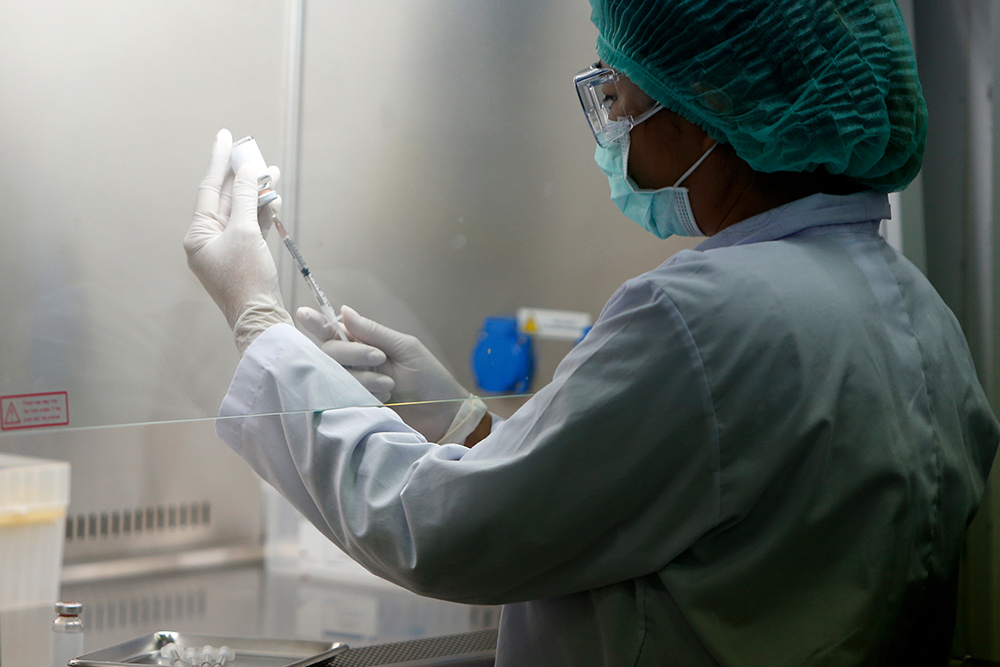
首批疫苗將獲得臨床批準并投放市場,。制藥業(yè)將會盡其所能研制疫苗,,因此我們有充分的理由期待,,這項前所未有的研究工作會取得成功,。然而,,我們并不想讓制藥公司做他們通常會做的一件事,,那就是決定讓誰優(yōu)先接種疫苗,。
雖然我們聽說過制藥公司為了研制新冠疫苗而暫停了研制其他疫苗的工作,,但是我們從瑞德西韋(Remdesivir)這一藥品的研制和定價來看,,醫(yī)藥公司依舊會生意興隆。第一位SARS-CoV-2疫苗接種者,,會不會是擁有最多信用卡或最具影響力的人,?還是屬于那些極易感染的人群或處于高風險環(huán)境下的一線工作者,?
基于這些問題的考慮,醫(yī)藥公司在定量配給這種潛在的冠狀病毒疫苗時應考慮以下幾個因素,。
第一個考慮因素是,,制藥公司應該依靠誰來做出疫苗配給的決定。如果制藥公司的領導人知道世界上只能得到1億劑疫苗,,那么最好的對策就是能夠有效地管理他們的資源,。要根除疫情就要從源頭上控制疫情,,在這種情況下,,制藥公司的領導人可能會將這一決定委托給世界衛(wèi)生組織(WHO)這種類型的機構,,授權他們可以在必要時進行干預。
但這樣的策略可能會在全球和地方政治中遭遇挑戰(zhàn),。在美國,,已經有三個組織——美國國家醫(yī)學院(National Academy of Medicine,,非營利性質機構)、為美國疾病控制與預防中心(the Centers for Disease Control and Prevention)工作并提供政策建議的美國免疫實施咨詢委員會(the Advisory Committee on Immunization Practices),,和致力于快速研制新型冠狀病毒疫苗的政府計劃“空間戰(zhàn)機行動”(Operation Warp Speed),,在美國應該如何決定誰先接種疫苗的問題上存在分歧,。面對這樣尷尬的狀況和與世衛(wèi)組織的對立,生產出第一批1億劑疫苗的公司將會面臨一個獨特的挑戰(zhàn),,即到底該聽誰的,。
其二,公司必須考慮誰可以安全地接種疫苗,。由于潛在的風險,,第一批疫苗的最初應用可能會局限于那些極易感染的人群。之前就出現過,,即使在疫苗被批準廣泛使用之后,,仍然會出現許多未知的狀況。倉促做出的決定可能導致安全問題,,這可能損害社會對疫苗的普遍信任,,尤其是對于此次疫情的全球化響應。
第三個倫理考慮是如何在各國之間分配疫苗,。這個決定不能基于支付意愿或支付能力的傳統(tǒng)參數,。即使我們假設各國政府的行動意圖是好的,但在先到先得的基礎上分配劑量或對疫苗定價以限制各國需求,,也會在全球范圍內造成分配方式的不平等,。
COVAXX是美國聯(lián)合生物醫(yī)學公司(United Biomedical)的一個部門,目前正在研制一種COVID-19疫苗并提供抗體測試,,現已建立了一個獨立的,、掌握特權的小組,為第一批1億劑疫苗的交易設定標準(我的公司IDEA Pharma是COVAXX的顧問),。如果公司不能依靠政府或國際組織的幫助——正如新冠疫苗的情況一樣,,他們必須建立自己的指導方針,。
這種小組必須滿足一些要求:它必須有足夠的多樣化的觀點。專家組的決定不應基于民族或種族,,但也不能忽視這些因素對疫苗需求的影響,;該組織不應一意孤行地只關注道德問題;該決定應該平衡經濟,、人類學,、病毒學、流行病學,、公共衛(wèi)生和政治因素,。
在美國關于奧巴馬醫(yī)改計劃(Obamacare)的辯論中,我們看到了“死亡小組”一詞的出現,,因此我們知道關于醫(yī)療配給的討論是多么具有爭議和令人不適。但我們必須定量配給,。最終,,第一批1億劑將會守護70億人的生命。但總有人會成為“一號接種者”,。
我們希望其他藥品制造商都能設立類似的委員會,。制藥公司的聲譽也許可以通過我們目前所見的其快速發(fā)展而得以挽救,或通過“生命小組”的緩慢而又慎重的思考而得以挽救,。(財富中文網)
邁克·雷亞是IDEA Pharma公司首席執(zhí)行官,。
編譯:劉心辰
首批疫苗將獲得臨床批準并投放市場。制藥業(yè)將會盡其所能研制疫苗,,因此我們有充分的理由期待,,這項前所未有的研究工作會取得成功。然而,,我們并不想讓制藥公司做他們通常會做的一件事,,那就是決定讓誰優(yōu)先接種疫苗。
雖然我們聽說過制藥公司為了研制新冠疫苗而暫停了研制其他疫苗的工作,,但是我們從瑞德西韋(Remdesivir)這一藥品的研制和定價來看,,醫(yī)藥公司依舊會生意興隆。第一位SARS-CoV-2疫苗接種者,,會不會是擁有最多信用卡或最具影響力的人,?還是屬于那些極易感染的人群或處于高風險環(huán)境下的一線工作者?
基于這些問題的考慮,,醫(yī)藥公司在定量配給這種潛在的冠狀病毒疫苗時應考慮以下幾個因素,。
第一個考慮因素是,制藥公司應該依靠誰來做出疫苗配給的決定,。如果制藥公司的領導人知道世界上只能得到1億劑疫苗,,那么最好的對策就是能夠有效地管理他們的資源,。要根除疫情就要從源頭上控制疫情,在這種情況下,,制藥公司的領導人可能會將這一決定委托給世界衛(wèi)生組織(WHO)這種類型的機構,,授權他們可以在必要時進行干預。
但這樣的策略可能會在全球和地方政治中遭遇挑戰(zhàn),。在美國,,已經有三個組織——美國國家醫(yī)學院(National Academy of Medicine,非營利性質機構),、為美國疾病控制與預防中心(the Centers for Disease Control and Prevention)工作并提供政策建議的美國免疫實施咨詢委員會(the Advisory Committee on Immunization Practices),,和致力于快速研制新型冠狀病毒疫苗的政府計劃“空間戰(zhàn)機行動”(Operation Warp Speed),在美國應該如何決定誰先接種疫苗的問題上存在分歧,。面對這樣尷尬的狀況和與世衛(wèi)組織的對立,,生產出第一批1億劑疫苗的公司將會面臨一個獨特的挑戰(zhàn),即到底該聽誰的,。
其二,,公司必須考慮誰可以安全地接種疫苗。由于潛在的風險,,第一批疫苗的最初應用可能會局限于那些極易感染的人群,。之前就出現過,即使在疫苗被批準廣泛使用之后,,仍然會出現許多未知的狀況,。倉促做出的決定可能導致安全問題,這可能損害社會對疫苗的普遍信任,,尤其是對于此次疫情的全球化響應,。
第三個倫理考慮是如何在各國之間分配疫苗。這個決定不能基于支付意愿或支付能力的傳統(tǒng)參數,。即使我們假設各國政府的行動意圖是好的,,但在先到先得的基礎上分配劑量或對疫苗定價以限制各國需求,也會在全球范圍內造成分配方式的不平等,。
COVAXX是美國聯(lián)合生物醫(yī)學公司(United Biomedical)的一個部門,,目前正在研制一種COVID-19疫苗并提供抗體測試,現已建立了一個獨立的,、掌握特權的小組,,為第一批1億劑疫苗的交易設定標準(我的公司IDEA Pharma是COVAXX的顧問)。如果公司不能依靠政府或國際組織的幫助——正如新冠疫苗的情況一樣,,他們必須建立自己的指導方針,。
這種小組必須滿足一些要求:它必須有足夠的多樣化的觀點。專家組的決定不應基于民族或種族,,但也不能忽視這些因素對疫苗需求的影響,;該組織不應一意孤行地只關注道德問題,;該決定應該平衡經濟、人類學,、病毒學,、流行病學、公共衛(wèi)生和政治因素,。
在美國關于奧巴馬醫(yī)改計劃(Obamacare)的辯論中,,我們看到了“死亡小組”一詞的出現,因此我們知道關于醫(yī)療配給的討論是多么具有爭議和令人不適,。但我們必須定量配給,。最終,第一批1億劑將會守護70億人的生命,。但總有人會成為“一號接種者”,。
我們希望其他藥品制造商都能設立類似的委員會。制藥公司的聲譽也許可以通過我們目前所見的其快速發(fā)展而得以挽救,,或通過“生命小組”的緩慢而又慎重的思考而得以挽救,。(財富中文網)
邁克·雷亞是IDEA Pharma公司首席執(zhí)行官。
編譯:劉心辰
There will be a first vaccine approved. There will be a first vaccine made available commercially. The pharmaceutical industry will do its thing, and we have good reason to expect success from an unprecedented research effort. However, there is a place where we don’t want pharma to do what it usually does, and that is to decide who gets that first vaccine.
While we’ve heard that pharma’s normal behavior has been suspended in pursuit of a vaccine for COVID-19, we have already seen rumblings of business as usual in the procurement and pricing of remdesivir. Should the first person to be vaccinated for SARS-CoV-2 be the one with the most exclusive credit card, or the most influential government? Should they be among the most vulnerable or the most critical frontline workers?
With these questions in mind, companies should take the following considerations into account for the rationing of a potential coronavirus vaccine.
The first consideration is over who pharma companies should rely on to make decisions about vaccine rationing. If pharma leaders knew the world would only ever get 100 million doses of vaccine, the best response would be to efficiently manage their resources. Eradication would be about management of outbreaks at their source, in which case pharma leaders might decide to delegate that decision to a World Health Organization (WHO)-type body, with a remit to intervene where necessary.
But such a strategy would run into challenges in global and local politics. Already, in the U.S., three groups—the National Academy of Medicine, a nonprofit; the Advisory Committee on Immunization Practices, which works within and advises policy for the Centers for Disease Control and Prevention; and Operation Warp Speed, a government program dedicated to fast-tracking coronavirus vaccine development—have disagreed about how the U.S. should decide who gets a vaccine first. In the face of such confusion, and antagonism to the WHO, the company making those first 100 million doses will face a unique challenge in deciding who to follow.
Second, companies must consider who can safely be given the vaccine. Because of potential risks, the first vaccine’s initial application may be limited with vulnerable populations. We’ve seen before that there are many unknowns about a vaccine even after it is approved for widespread use. Decisions taken in haste can lead to safety issues, which could damage society’s belief in vaccines in general, and the global response to this pandemic specifically.
The third ethical consideration is how to distribute the vaccine among countries. The decision cannot be based on traditional parameters of willingness or ability to pay. Even if we assume that governments are acting with the best of intentions, allocating doses on a first-come, first-served basis or pricing the vaccine to limit demand will create inequality in how it’s allocated worldwide.
COVAXX, a division of United Biomedical that is developing a COVID-19 vaccine and offers an antibody test, has created an independent prioritization panel to set criteria for any deals done for the first 100 million vaccine doses. (My company, IDEA Pharma, is advising COVAXX.) If companies cannot rely on help from governments or international organizations—as is clearly the case with COVID-19—they must instead establish their own guidelines.
Such a panel must meet a few requirements. It should have adequate diversity of opinion. The panel should not base its decisions on ethnicity or race—but it also cannot ignore the influence those factors will have on demand. The group should not have a singleminded focus on ethics; that should be balanced with economic, anthropological, virological, epidemiological, public health, and political considerations.
During the debate over Obamacare in the U.S., we saw the emergence of the term “death panels,” so we know how controversial and uncomfortable discussions over the rationing of care can be. But ration we must. Eventually, the first 100 million doses will lead to 7 billion protected lives. But someone will be patient No. 1.
We should hope that all other manufacturers adopt similar committees. Pharma’s reputation may be saved by the warp-speed development we’re currently seeing, but also perhaps by the slow, intentional reflection of a “l(fā)ife panel.”
Mike Rea is CEO of IDEA Pharma.






